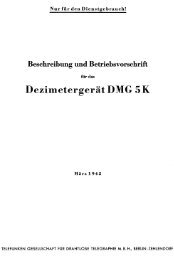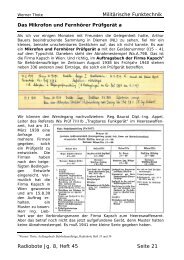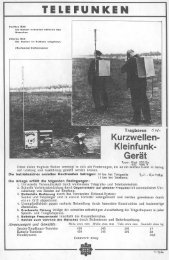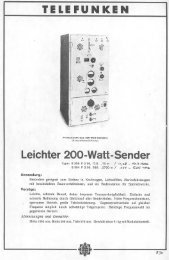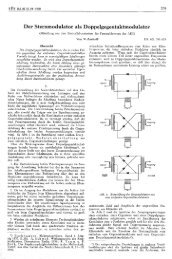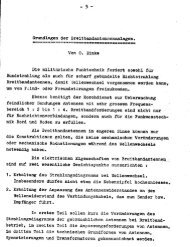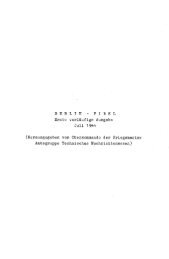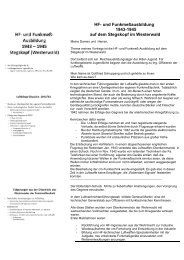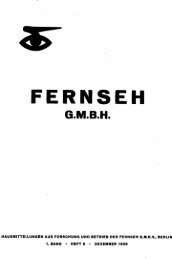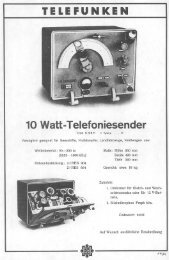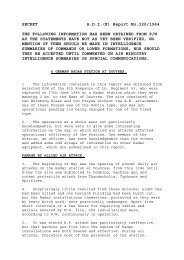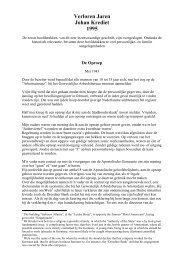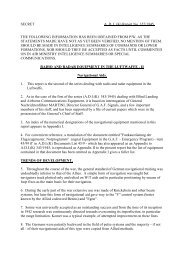SECRET A. D. I. (K) Report No. 393/1945 THE ... - Cdvandt.org
SECRET A. D. I. (K) Report No. 393/1945 THE ... - Cdvandt.org
SECRET A. D. I. (K) Report No. 393/1945 THE ... - Cdvandt.org
Create successful ePaper yourself
Turn your PDF publications into a flip-book with our unique Google optimized e-Paper software.
movements, etc. For this information he relied mainly on the W/T<br />
listening service; the results of his findings he embodied in as air<br />
situation report.<br />
GERMAN INTELLIGENCE – CONCLUSIONS.<br />
61. The mentality of the German rulers, who had risen to power in<br />
internal political strife and were fanatical to the point of despising<br />
the intelligence of the so-called "Intellektuellen", was such that they<br />
were incapable of appreciating an intelligence service of their own<br />
fashioning or of respecting the intelligence service of the enemy.<br />
Otherwise according to WODARG, they would have avoided the War in the<br />
first place, or having recognised the absolute superiority of the enemy,<br />
would have concluded peace earlier - about the beginning of 1942.<br />
62. The General Staff of the G.A.F., in common with the other branches<br />
of the armed forces, was in WODARG's opinion too small and untrained to<br />
assume effective leadership even if the Chief of Staff had recognised<br />
the value of the intelligence service in general or appreciated its work<br />
in detail. Since this recognition was lacking, Ic was inadequately<br />
staffed in comparison with Ia, the operations department. Moreover, the<br />
lack of co-ordination between the sources of information and Ic limited<br />
considerably the latter's ability to draw up a complete intelligence<br />
picture.<br />
63. The activity of the General Staff and particularly the Ic<br />
department was further crippled by HIMMLER's assumption of power over<br />
the State and armed forces, and from spring 1944 onwards the General<br />
Staff had to struggle for existence against the encroachments of the<br />
S.S.<br />
64. Hauptmann ZETZSCHE has summed up the main weaknesses of German<br />
Intelligence during the War in the following main points:-<br />
A) Within the State.<br />
i) There was no hard and fast Ic <strong>org</strong>anisation within the<br />
Wehrmacht with boundaries clearly demarcated from those<br />
of similar civil bodies.<br />
ii)<br />
Wehrmachtführungsstab Ic did not co-ordinate the work of<br />
the Heeres-, Marine- and Luftwaffenführungsstäbe Ic, but<br />
was merely a distributing agency for the Ic reports of<br />
the individual Wehrmacht components, exercising<br />
practically no authority over them.<br />
iii) The large number of intelligence <strong>org</strong>anisations in Germany<br />
without clearly defined tasks, including O.K.W./<br />
Amtsgr.Ausland, R.S.H.A. (Mil.Amt), R.S.H.A. (Hauptamt<br />
IV) and Reichsministerium Speer (1. Abtlg). (The<br />
Propaganda Ministry and the Foreign Office also partly<br />
covered the same territory).<br />
iv)<br />
The lack of a Ministry of Economic Warfare. Military<br />
Commands were obliged to cope with the problems without<br />
expert knowledge or guidance, (e.g. in the Battle of



